10 nov 2016
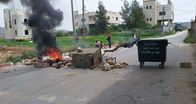
Violent clashes broke out Thursday between dozens of local youths and Israeli Occupation Forces (IOF) at the western entrance to Beit Furik town, east of Nablus.
Local sources affirmed that the clashes broke out when Israeli forces suppressed a peaceful march commemorating the 12th anniversary of late Palestinian President Yasser Arafat’s death.
During the clashes, local youths set fire to tires near an Israeli military checkpoint erected at the entrance to the town and stoned a number of Israeli soldiers stationed in the area.
Israeli forces fired teargas bombs at the participants, the sources added.
The sources pointed out that Israeli forces and settlers were deployed in large numbers in the area since the morning hours.
Local sources affirmed that the clashes broke out when Israeli forces suppressed a peaceful march commemorating the 12th anniversary of late Palestinian President Yasser Arafat’s death.
During the clashes, local youths set fire to tires near an Israeli military checkpoint erected at the entrance to the town and stoned a number of Israeli soldiers stationed in the area.
Israeli forces fired teargas bombs at the participants, the sources added.
The sources pointed out that Israeli forces and settlers were deployed in large numbers in the area since the morning hours.
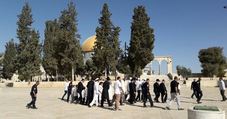
A group of Israeli settlers stormed Thursday morning al-Aqsa Mosque compound in occupied Jerusalem in the latest incursion into one of the holiest sites in Islam.
At least 21 settlers broke into the compound in two groups under full protection of Israel's special police forces.
The settlers performed Talmudic rituals in total provocation to Palestinian worshipers.
Meanwhile, heavily-armed Israeli Special Forces stormed the Mosque in order to pave the way for settlers’ provocative break-ins.
According to Israeli sources, 14,094 Israeli settlers stormed al-Aqsa from September 2015 to October 2016. 3,000 of them broke into the compound in October 2016.
The Islamic Waqf Department, which manages al-Aqsa Mosque affairs, held the Israeli authorities responsible for settlers’ incursions and reneging on international laws.
The Waqf Department stated that al-Aqsa Mosque is revered by more than 1.6 billion Muslims worldwide, and that the existing accords prohibit Jewish prayers inside the Mosque.
At least 21 settlers broke into the compound in two groups under full protection of Israel's special police forces.
The settlers performed Talmudic rituals in total provocation to Palestinian worshipers.
Meanwhile, heavily-armed Israeli Special Forces stormed the Mosque in order to pave the way for settlers’ provocative break-ins.
According to Israeli sources, 14,094 Israeli settlers stormed al-Aqsa from September 2015 to October 2016. 3,000 of them broke into the compound in October 2016.
The Islamic Waqf Department, which manages al-Aqsa Mosque affairs, held the Israeli authorities responsible for settlers’ incursions and reneging on international laws.
The Waqf Department stated that al-Aqsa Mosque is revered by more than 1.6 billion Muslims worldwide, and that the existing accords prohibit Jewish prayers inside the Mosque.
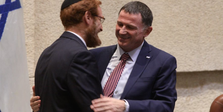
A conference of Israelis seeking to change al-Aqsa’s status quo takes place in parliament. A Temple Mount Lobby is born.
The tenth annual the Seekers of Zion conference was held in Israeli parliament on Monday, Haaretz reports.
Israeli citizens and politicians gathered at the event to discuss and organize around altering al-Aqsa’s status quo. Participants also rallied around the creation of a new “Temple Mount Lobby” in the Israeli Knesset.
The Temple Mount, revered as al-Aqsa by Muslims, is a compound above the Western Wall in Jerusalem that includes the Dome of the Rock and al-Aqsa Mosque. Since the 1967 occupation, an agreement with Jordan has maintained that Jewish prayer takes place at the Western Wall plaza – which was built on the site of a Palestinian neighborhood destroyed by Israel in 1967– but not in al-Aqsa compound itself.
Settler, temple movement leader, and recently appointed Likud Member of Knesset (MK) Yehuda Glick organized the conference. Other Israeli politicians in attendance included Public Security Minister Gilad Erdan, Parliament speaker Yuli Edelstein, Agricultural Minister Uri Ariel, Deputy Minister of Defense Eli Ben-Dahan, Environmental Affairs Minister Ze’ev Elkin, Deputy Foreign Minister Tizipi Htovely, as well as MKs Amir Ohana, Anat Berko, and Shuli Mualem.
A few of the politicians took the stage to profess their support for Jewish prayer at al-Aqsa.
“In my opinion, our right to the Temple Mount is unshakeable,” Erdan stated. Echoing Glick’s rhetoric of “apartheid” at al-Aqsa, Erdan added, “I have said many times, the current status quo at the Temple Mount discriminates against the Jewish people.”
When Ariel spoke to the audience, he insisted, “open the gates to the Temple Mount… End the disgrace, end the wretchedness, end the lack of sovereignty.”
“We have to call upon the government and Knesset to permit Jewish prayer, to make Jewish prayer something normal and permitted,” Ben-Dahan offered.
Hotovely urged, “everyone who has not ascended to the Temple Mount to visit the Temple Mount.”
Right-wing Israeli activists partook in the conference as well. In attendance included Temple Mount joint council head Yaakov Heimann, settler Rabbi Yisrael Ariel, and leader of “Return to the Mount” Rafael Morris.
Morris connected imposing Israeli sovereignty over al-Aqsa to the establishment of so-called Greater Israel:
When we can say the Temple Mount is ours and only ours and there isn’t room there for anyone else, then we can be victorious in Amona, then we can conquer not only the Temple Mount but Jordan, and Syria, too, and establish a real Jewish state over all the land of Israel.
Mainstream Judaism perceives the reconstruction of a Jewish temple on al-Aqsa compound as not as an immediate task, but one meant for eschatological times, after the coming of the messiah. Most orthodox rabbis maintain that access to the site is prohibited for Jews until then.
But, there is a growing movement of Israelis that openly work to upend al-Aqsa’s status quo and force it open to Jewish prayer. Some even do so with the goal of building a Jewish temple there.
Organizing Jewish tours with the intention of exceeding the “sightseeing” activities the status quo asks non-Muslims to adhere to is a key part of their effort. During the tours, participants attempt to utter Jewish prayers or walk barefoot at the site, at the same time as their armed Israeli police escorts exact violence and movement restrictions directed on Muslims and Palestinians.
Palestinians as well as the Jordanian Waqf that oversees the site say that though al-Aqsa’s status quo may appear contained to the rest of the world, Israeli police and settler conduct at have already changed it.
The tenth annual the Seekers of Zion conference was held in Israeli parliament on Monday, Haaretz reports.
Israeli citizens and politicians gathered at the event to discuss and organize around altering al-Aqsa’s status quo. Participants also rallied around the creation of a new “Temple Mount Lobby” in the Israeli Knesset.
The Temple Mount, revered as al-Aqsa by Muslims, is a compound above the Western Wall in Jerusalem that includes the Dome of the Rock and al-Aqsa Mosque. Since the 1967 occupation, an agreement with Jordan has maintained that Jewish prayer takes place at the Western Wall plaza – which was built on the site of a Palestinian neighborhood destroyed by Israel in 1967– but not in al-Aqsa compound itself.
Settler, temple movement leader, and recently appointed Likud Member of Knesset (MK) Yehuda Glick organized the conference. Other Israeli politicians in attendance included Public Security Minister Gilad Erdan, Parliament speaker Yuli Edelstein, Agricultural Minister Uri Ariel, Deputy Minister of Defense Eli Ben-Dahan, Environmental Affairs Minister Ze’ev Elkin, Deputy Foreign Minister Tizipi Htovely, as well as MKs Amir Ohana, Anat Berko, and Shuli Mualem.
A few of the politicians took the stage to profess their support for Jewish prayer at al-Aqsa.
“In my opinion, our right to the Temple Mount is unshakeable,” Erdan stated. Echoing Glick’s rhetoric of “apartheid” at al-Aqsa, Erdan added, “I have said many times, the current status quo at the Temple Mount discriminates against the Jewish people.”
When Ariel spoke to the audience, he insisted, “open the gates to the Temple Mount… End the disgrace, end the wretchedness, end the lack of sovereignty.”
“We have to call upon the government and Knesset to permit Jewish prayer, to make Jewish prayer something normal and permitted,” Ben-Dahan offered.
Hotovely urged, “everyone who has not ascended to the Temple Mount to visit the Temple Mount.”
Right-wing Israeli activists partook in the conference as well. In attendance included Temple Mount joint council head Yaakov Heimann, settler Rabbi Yisrael Ariel, and leader of “Return to the Mount” Rafael Morris.
Morris connected imposing Israeli sovereignty over al-Aqsa to the establishment of so-called Greater Israel:
When we can say the Temple Mount is ours and only ours and there isn’t room there for anyone else, then we can be victorious in Amona, then we can conquer not only the Temple Mount but Jordan, and Syria, too, and establish a real Jewish state over all the land of Israel.
Mainstream Judaism perceives the reconstruction of a Jewish temple on al-Aqsa compound as not as an immediate task, but one meant for eschatological times, after the coming of the messiah. Most orthodox rabbis maintain that access to the site is prohibited for Jews until then.
But, there is a growing movement of Israelis that openly work to upend al-Aqsa’s status quo and force it open to Jewish prayer. Some even do so with the goal of building a Jewish temple there.
Organizing Jewish tours with the intention of exceeding the “sightseeing” activities the status quo asks non-Muslims to adhere to is a key part of their effort. During the tours, participants attempt to utter Jewish prayers or walk barefoot at the site, at the same time as their armed Israeli police escorts exact violence and movement restrictions directed on Muslims and Palestinians.
Palestinians as well as the Jordanian Waqf that oversees the site say that though al-Aqsa’s status quo may appear contained to the rest of the world, Israeli police and settler conduct at have already changed it.
9 nov 2016
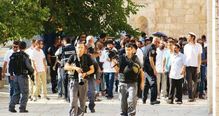
Dozens of Israeli settlers stormed Wednesday morning al-Aqsa Mosque from the Magharibeh gate under heavy police protection, according to Quds Press.
Heavily-armed Israeli Special Forces stormed the Mosque in order to pave the way for settlers’ provocative break-ins.
Nearly 100 settlers broke into the holy shrine since the early morning hours, the sources reported.
According to Israeli sources, 14,094 Israeli settlers stormed al-Aqsa from September 2015 to October 2016. 3,000 of them broke into the compound in October 2016.
Heavily-armed Israeli Special Forces stormed the Mosque in order to pave the way for settlers’ provocative break-ins.
Nearly 100 settlers broke into the holy shrine since the early morning hours, the sources reported.
According to Israeli sources, 14,094 Israeli settlers stormed al-Aqsa from September 2015 to October 2016. 3,000 of them broke into the compound in October 2016.
8 nov 2016
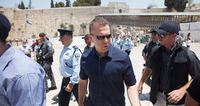
Israeli ministers and MKs announced on Monday their intents to alter the status quo at the holy al-Aqsa Mosque, challenging a 1993 deal with Jordan granting the latter sovereignty over the mosque, among other Islamic holy sites in Occupied Jerusalem.
Speaking at a Knesset-hosted conference organised by “Temple Mount” activists advocating fundamental changes in the status quo at the Al-Aqsa Mosque compound, Israeli ministers and MKs launched calls for splitting up the site between Muslims and Israelis.
Three cabinet ministers were among those at the gathering, which saw the launch of a new Knesset “Temple Mount Lobby”.
Public Security Minister Gilad Erdan told the gathering: “In my opinion, our right to the Temple Mount is unshakeable”, complaining that “the current status quo…discriminates against the Jewish people.”
Meanwhile, Environmental Affairs Minister Zeev Elkin “applauded” the “Temple Mount” activists, saying: “Often you are doing the work that the government doesn’t do as regards Jews’ right to the temple.”
Agriculture Minister Uri Ariel appealed for the Al-Aqsa Mosque compound to be open to Jewish prayer, yelling: “End the disgrace, end the wretchedness, end the lack of sovereignty.”
Deputy Defence Minister Eli Ben-Dahan similarly told the conference: “We have to call upon the government and Knesset to permit Jewish prayer [in the compound], to make Jewish prayer something normal and permitted.”
Deputy Foreign Minister Tzipi Hotovely also “urge[d] everyone” to enter the Al-Aqsa Mosque compound if they have not yet done so.
Rafael Morris, the founder of the “Return to the Mount” movement, told the conference: “When we can say the Temple Mount is ours and only ours and there isn’t room there for anyone else, then we can be victorious in Amona [illegal West Bank outpost], then we can conquer not only the Temple Mount but Jordan and Syria too, and establish a real Jewish state over all the land of Israel.”
Yesterday marked the first time that this annual conference had been held at the Knesset, and was organised by fanatic “Temple Mount” campaigner and Likud MK Yehuda Glick.
Speaking at a Knesset-hosted conference organised by “Temple Mount” activists advocating fundamental changes in the status quo at the Al-Aqsa Mosque compound, Israeli ministers and MKs launched calls for splitting up the site between Muslims and Israelis.
Three cabinet ministers were among those at the gathering, which saw the launch of a new Knesset “Temple Mount Lobby”.
Public Security Minister Gilad Erdan told the gathering: “In my opinion, our right to the Temple Mount is unshakeable”, complaining that “the current status quo…discriminates against the Jewish people.”
Meanwhile, Environmental Affairs Minister Zeev Elkin “applauded” the “Temple Mount” activists, saying: “Often you are doing the work that the government doesn’t do as regards Jews’ right to the temple.”
Agriculture Minister Uri Ariel appealed for the Al-Aqsa Mosque compound to be open to Jewish prayer, yelling: “End the disgrace, end the wretchedness, end the lack of sovereignty.”
Deputy Defence Minister Eli Ben-Dahan similarly told the conference: “We have to call upon the government and Knesset to permit Jewish prayer [in the compound], to make Jewish prayer something normal and permitted.”
Deputy Foreign Minister Tzipi Hotovely also “urge[d] everyone” to enter the Al-Aqsa Mosque compound if they have not yet done so.
Rafael Morris, the founder of the “Return to the Mount” movement, told the conference: “When we can say the Temple Mount is ours and only ours and there isn’t room there for anyone else, then we can be victorious in Amona [illegal West Bank outpost], then we can conquer not only the Temple Mount but Jordan and Syria too, and establish a real Jewish state over all the land of Israel.”
Yesterday marked the first time that this annual conference had been held at the Knesset, and was organised by fanatic “Temple Mount” campaigner and Likud MK Yehuda Glick.
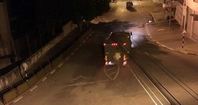
Violent clashes burst out at dawn Tuesday after dozens of Israeli fanatics stormed Joseph’s Tomb in eastern Nablus province.
A PIC news correspondent said dozens of Israeli army jeeps rolled into Nablus’s eastern corners at predawn time, paving the way for the mass break-in.
According to eyewitnesses the break-in was carried out at 01 a.m. via the Beit Furik and Al-Ghawi crossroads. Two settler batches stormed the area, sparking clashes with the Palestinian protesters.
Palestinian citizen Ahmad Al-Salman said that 700 fanatic settlers, crammed into Israeli buses, forced their ways into the plaza and environs of the shrine.
The clashes spread out to Balata camp and Amman Street, where the occupation troops attacked the Palestinian protesters with heavy barrages of teargas canisters, resulting in several suffocation cases.
Palestinian citizen Nidhal Kaabi, from Balata camp, said civilians could not reach the local mosque, adjacent to Balata’s northern entrance, to perform dawn prayers due to the presence of Israeli soldiers, who withdrew at 5:30 a.m.
Over recent days, extremist settler gangs announced their intent to storm Joseph’s Tomb and called for mass participation in the break-in.
In another development, the Israeli occupation army seized machinery from a Palestinian workshop in the northern West Bank city of Jenin.
Earlier, the occupation forces claimed responsibility for the confiscation of the equipment of over 120 workshops in the West Bank on claims that they were used to manufacture homemade weapons.
Violent confrontations burst out in the area following the assault.
A few hours earlier, the occupation patrols came down heavily on the Palestinians of Zabouba town, to the west of Jenin, and sealed off the main thoroughfare to the area with a military checkpoint as part of a policy of collective punishment against civilians.
A PIC news correspondent said dozens of Israeli army jeeps rolled into Nablus’s eastern corners at predawn time, paving the way for the mass break-in.
According to eyewitnesses the break-in was carried out at 01 a.m. via the Beit Furik and Al-Ghawi crossroads. Two settler batches stormed the area, sparking clashes with the Palestinian protesters.
Palestinian citizen Ahmad Al-Salman said that 700 fanatic settlers, crammed into Israeli buses, forced their ways into the plaza and environs of the shrine.
The clashes spread out to Balata camp and Amman Street, where the occupation troops attacked the Palestinian protesters with heavy barrages of teargas canisters, resulting in several suffocation cases.
Palestinian citizen Nidhal Kaabi, from Balata camp, said civilians could not reach the local mosque, adjacent to Balata’s northern entrance, to perform dawn prayers due to the presence of Israeli soldiers, who withdrew at 5:30 a.m.
Over recent days, extremist settler gangs announced their intent to storm Joseph’s Tomb and called for mass participation in the break-in.
In another development, the Israeli occupation army seized machinery from a Palestinian workshop in the northern West Bank city of Jenin.
Earlier, the occupation forces claimed responsibility for the confiscation of the equipment of over 120 workshops in the West Bank on claims that they were used to manufacture homemade weapons.
Violent confrontations burst out in the area following the assault.
A few hours earlier, the occupation patrols came down heavily on the Palestinians of Zabouba town, to the west of Jenin, and sealed off the main thoroughfare to the area with a military checkpoint as part of a policy of collective punishment against civilians.
7 nov 2016
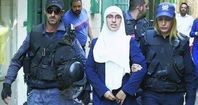
The Israeli police forces arrested Monday afternoon two Palestinian women while leaving al-Aqsa Mosque and closed a wedding hall in occupied Jerusalem. Local sources said that the two Jerusalemite women were detained and taken to a nearby investigation center just after leaving al-Aqsa.
Meanwhile, Israeli police closed a wedding hall in Alezariye town, southeast of occupied Jerusalem, over noise pretexts.
Eyewitnesses affirmed that Israeli forces stormed the town and broke into the wedding hall before pasting a copy of the closure order on the gate under the pretext of annoying the settlers in Ma'ale Adumim settlement illegally built on the town's land.
Along the same line, Israeli forces confiscated Palestinian-owned agricultural facilities in Samu town, south of al-Khalil.
The confiscated facilities include construction materials, water tank, and a mobile house.
Meanwhile, Israeli police closed a wedding hall in Alezariye town, southeast of occupied Jerusalem, over noise pretexts.
Eyewitnesses affirmed that Israeli forces stormed the town and broke into the wedding hall before pasting a copy of the closure order on the gate under the pretext of annoying the settlers in Ma'ale Adumim settlement illegally built on the town's land.
Along the same line, Israeli forces confiscated Palestinian-owned agricultural facilities in Samu town, south of al-Khalil.
The confiscated facilities include construction materials, water tank, and a mobile house.
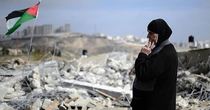
Israeli Mayor of occupied Jerusalem Nir Barkat threatened Monday to demolish thousands of Jerusalemite homes in case any of the West Bank settlements was evacuated.
Barkat’s statements came after the Israeli High Court issued a decision to evacuate dozens of Israeli settlers living in Amona settlement illegally built on a Palestinian-private land in West Bank.
"Jerusalem faces a situation similar to that of Amona but with the roles of Arabs and Jews reversed. This is especially true in eastern Jerusalem where there are many areas of Jewish-owned land which are currently encroached on by Arab squatters," Israeli radio quoted Barkat as claiming.
“If Arabs living on Jewish-owned property were to be treated the same way the residents of Amona are being treated for living on property allegedly owned by Arabs, the city would be obligated to evict thousands of Arabs from their homes,” according to his statements.
The Israeli High Court had earlier ordered that the entire outpost of Amona be dismantled by Dec. 25 this year.
In this regard, Barkat contacted Israeli Attorney General Avichai Mandelblit to ask him “to examine the consequences of the High Court decision to demolish the settlement of Amona on property in Jerusalem.”
The Israeli-controlled municipality in occupied Jerusalem had escalated since the beginning of 2016 its demolition policy against Palestinian properties under the pretext of being built without Israeli permit.
Barkat’s statements came after the Israeli High Court issued a decision to evacuate dozens of Israeli settlers living in Amona settlement illegally built on a Palestinian-private land in West Bank.
"Jerusalem faces a situation similar to that of Amona but with the roles of Arabs and Jews reversed. This is especially true in eastern Jerusalem where there are many areas of Jewish-owned land which are currently encroached on by Arab squatters," Israeli radio quoted Barkat as claiming.
“If Arabs living on Jewish-owned property were to be treated the same way the residents of Amona are being treated for living on property allegedly owned by Arabs, the city would be obligated to evict thousands of Arabs from their homes,” according to his statements.
The Israeli High Court had earlier ordered that the entire outpost of Amona be dismantled by Dec. 25 this year.
In this regard, Barkat contacted Israeli Attorney General Avichai Mandelblit to ask him “to examine the consequences of the High Court decision to demolish the settlement of Amona on property in Jerusalem.”
The Israeli-controlled municipality in occupied Jerusalem had escalated since the beginning of 2016 its demolition policy against Palestinian properties under the pretext of being built without Israeli permit.
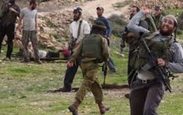
Israeli settlers have reportedly stolen olive crops gathered from land belonging to farmers from the village of Deir Sharaf, to the northwest of Nablus, a Palestinian official said on Monday.
Ghassan Daghlas, the Palestinian Authority official in charge of the settlements file in the northern occupied West Bank, told WAFA that the farmers discovered, when they returned Monday morning, to their lands located inside the border fence of Shavi Shomron settlement, to continue with the olive harvest, that their crop from the night before was missing.
He said that the farmers had a permit from the Israeli government to harvest their olive crops on land located inside the settlement fence for a few days, and for certain hours a day.
However, they believe that settlers from Shavi Shomron came to their land during the night and stole the harvest.
The farmers normally leave their crop on the land and collect it at one time, at the end of the harvest period.
Ghassan Daghlas, the Palestinian Authority official in charge of the settlements file in the northern occupied West Bank, told WAFA that the farmers discovered, when they returned Monday morning, to their lands located inside the border fence of Shavi Shomron settlement, to continue with the olive harvest, that their crop from the night before was missing.
He said that the farmers had a permit from the Israeli government to harvest their olive crops on land located inside the settlement fence for a few days, and for certain hours a day.
However, they believe that settlers from Shavi Shomron came to their land during the night and stole the harvest.
The farmers normally leave their crop on the land and collect it at one time, at the end of the harvest period.
